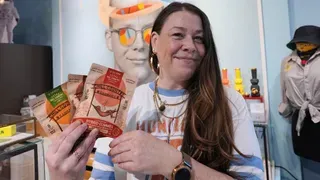June 4, 2009
Another Gay Penguin Couple Adopt, Hatch Egg
Kilian Melloy READ TIME: 6 MIN.
A pair of male penguins in a German zoo have taken in an egg that was rejected by its biological parents, hatched the egg, and now are rearing the chick, according to a June 3 article carried at BBC News.
Such behavior is not unknown. In many animal species, from fruit flies to birds to primates, same-gender sexual contact and social bonding (including long term pair bonding) have been observed.
In the case of Z and Vielpunkt, two penguins at the zoo in Bremerhaven, the pair had been observed attempting to hatch a stone. When a male-female pair of penguins at the zoo rejected their own egg, keepers gave it to Z and Vielpunkt, who tended and hatched the egg and now, a month after its hatching, continue to care for the chick.
The BBC article noted that four years ago the same zoo, which houses three pairs of male penguins exhibiting mating and bonding behavior, tried to coax the males into a heterosexual relationship by introducing four female penguins. The zoo made this attempt because the particular species of penguin in question is endangered.
However, those attempts were suspended when the male penguins showed no interest in the females. Meantime, GLBT activists protested that the zoo's strategy constituted an attempt to force the birds into relationships they would not naturally have entered into on their own.
The article included a snippet from a statement made by the zoo. "Z and Vielpunkt, both males, gladly accepted their 'Easter gift' and got straight down to raising it."
Added the statement, "Since the chick arrived, they have been behaving just as you would expect a heterosexual couple to do.
"The two happy fathers spend their days attentively protecting, caring for and feeding their adopted offspring."
In the United States, one celebrated penguin pairing, between Roy and Silo, male penguins living in New York' Central Park Zoo, served as the basis for the children's book "And Tango Makes Three."
The book, written by Justin Richardson and Peter Parnell, had its origins in a newspaper account of how the two male penguins were observed not only nesting together, but also caring for a small rock as though it were an egg.
Anti-gay sentiment has led to "And Tango Makes Three" being at the top of the "challenged books" list for three consecutive years.
Said Deborah Caldwell-Stone, the deputy director of the American Library Association, which publishes an annual list of challenged books, of the title's top spot on the most recent list of challenged books, "Books that address same-sex parenting, or same-sex relationships, are particularly prone to challenges in the U.S."
Added Caldwell-Stone, "In the case of 'And Tango Makes Three,' there are many parents who believe it inappropriate to teach children anything at all about homosexual relationships, even in the form of a picture book about a true story."
Those who view homosexuality as unnatural or a matter of "choice" in human beings reject the idea that homosexuality is observable in other animal species.
Some claim that homosexual relations between animals in a zoo setting proves that homosexuality is the result of environmental pressures or an artificial grouping together of animals of the same gender.
Such claims, however, do not take into account episodes of same-sex couples among penguins who live in zoos with both male and female penguins, or observed instances of animals exhibiting same-gender sexual behavior in the wild. Indeed, same-sex bird pairings have been observed in the wild, with birds of the same gender nesting together.
Others reject the idea that animal behavior has any bearing on human conduct, although humans, like other animal species, can be viewed scientifically as responding to four basic impulses rooted in the brain's pre-existing functions. The sex drive is one such function; human beings who are gay say that their attraction to the same gender is a spontaneous, deeply felt, and natural part of their identities, and not something they decided upon.
Critics, however, resort to the argument that if humans, like animals, can be gay as a matter of intrinsic nature, then other animal impulses that would be socially rejected if expressed by human beings might also find their way into polite company.
Once the conversational participants at conservative chat site Free Republic.com got past making puns on the word "rear" (as in to rear young, the correct word for tending to human offspring, as opposed to livestock, which is raised), the conversational thread picked reflected just such objections.
Wrote one chat participant, "Leave it to degenerate minds to stamp penguins as 'gay' because they feel the drive to protect the endangered young penguins."
Added the chat participant, " I lost my tolerance of the homosexual degenerates long ago. And they are building up a heck of a lot of negative karma with the ever increasing insistance [sic] they be accepted as normal.
"They aren't and never will be without medical help."
Answered another dryly, "I say the penguins are confused, which is kind of saying the same thing."
Another wrote, "Animals of various species do all sorts of wierd [sic] behaviors, including mating behaviors.
"They are not humans, so such things are irrelevant for what humans do or should do."
Wrote in another, "In human populations, if gays want to 'rear' children, it takes activist judges, a belligerent family court system, twisted adoption laws, and speech codes which allow for the ridicule of anyone against gays 'rearing' children."
Some seemed uncertain about what same-sex parenting in the penguin world entailed. Wrote one commentator, "Penguin pedophiles. Deviancy knows no limits."
Others leapt to even dizzier heights of non-sequitur, with one participant contributing the comment, "Time to legalize human-penguin marriage. Penguinophiles deserve equality."
Others anthropomorphized the penguins' conduct, assigning political significance to their same-sex bonding. "Just you wait until the 'gay' penguins get their own proposition then start protesting the Mormon penguins who didn't want any part of this crap," wrote one site user.
By contrast, one participant imagined a host of other observed animal behaviors entering human society. "So we're taking our social cues from critters? How freeing. Now we can shake hands and introduce ourselves the way dogs do.
"We can eat poop like the chimps in the zoo," continued the posting.
"We can eat the placenta, raw, the way many mammals do.
"We can bite when threatened or provoked.
"We can sleep 22 hours a day, like my dogs.
"We can drop one on any person any time, like the bonobo apes," the posting went on, referencing a simian species notable for its frequently observed same-gender sexual contact.
Added the posting, "We seem to be headed there as a culture."
At least one participant demonstrated some familiarity with the penguin reproductive cycle, writing, "This behavior (males raising chicks) is a normal part of penguin life. After laying eggs, the females return to the sea for food while the males hatch the eggs. The females return with food for themselves and the chicks and the males then take their turn to get food.
"There's nothing gay about it."
To be sure, some species of penguin select a new mate every year, rather than settling in with one mate for the course of several years. The observation that gay male penguin pairs remain together over time may seem remarkable for this fact alone.
"There was a story a while back that said the straight penguins had ostracized the homosexual penguins from their community because the homosexual penguins has been attempting to steal their eggs," wrote in another.
"Hows that for testing the behaviors of animals?" continued the commentator, who did not, however, mention that penguins exhibiting heterosexual conduct will also attempt to steal eggs if their own eggs are lost.
The episode concerned two male penguins in a Chinese zoo who attempted to substitute stones for eggs, evidently in an attempt to procure and care for an egg of their own. The story was carried by the U.K. newspaper The Telegraph last Nov. 27.
That article carried a quote from a keeper, who said, "One of the responsibilities of being a male adult is looking after the eggs.
"Despite this being a biological impossibility for this couple, the natural desire is still there."
One chat member recalled having heard about a gay penguin who left his male partner and began nesting with a female. Wrote that chat member, "Is this the same zoo that lost one of its 'gay' penguins when a female tempted it back to the other side of the street."
In fact, it was one of Tango's adopted fathers, Silo, who had been with Roy for six years, but then began to nest with a female, Scrappy, in 2005. If anything, the move proved that, far from brute simplicity, animal conduct can be as complex as that exhibited by humans.
The following year, Silo no longer associated with Scrappy.
As the Bremerhaven zoo's statement went on to say, "Homosexuality is nothing unusual among animals.
"Sex and coupling up in our world do not necessarily have anything to do with reproduction," the statement continued.
Kilian Melloy serves as EDGE Media Network's Associate Arts Editor and Staff Contributor. His professional memberships include the National Lesbian & Gay Journalists Association, the Boston Online Film Critics Association, The Gay and Lesbian Entertainment Critics Association, and the Boston Theater Critics Association's Elliot Norton Awards Committee.






